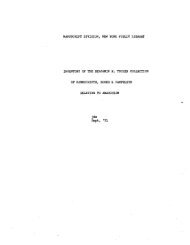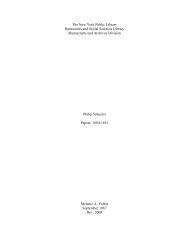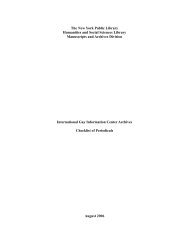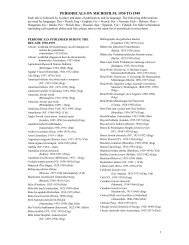pdf available - Multiple Choices
pdf available - Multiple Choices
pdf available - Multiple Choices
You also want an ePaper? Increase the reach of your titles
YUMPU automatically turns print PDFs into web optimized ePapers that Google loves.
of worship took upon themselves the responsibility<br />
for providing the funds to cover the expenses<br />
of keeping them clean, providing water, light,<br />
heat during the winter, security, etc. They did<br />
this by means of donations, vows, and selling<br />
aliyot on Sabbaths and festivalsall voluntarily<br />
and usually generously. If it happened on occasion<br />
that there was a deficit, the gabbai would<br />
announce the "confiscation of prayer shawls" at<br />
the Torah reading on a Sabbath, and would permit<br />
them to be redeemed after the Sabbath with a<br />
cash payment. With the end of services that<br />
morning, each worshipper would place his prayer<br />
shawl on the table and go home without it, as a<br />
sign of solidarity and agreement with the "confiscation."<br />
Even those who had actually fulfilled all<br />
their obligations toward the synagogue would do<br />
the same. This "confiscation" was the only involuntary<br />
means of fund raising <strong>available</strong> to the<br />
gabbai , but it was stronger than any other means,<br />
for the worshippers could not pray without a<br />
prayer shawl Immediately after the conclusion<br />
of the Sabbath the "debtors" would hurry to pay<br />
their debts and redeem their prayer shawls.<br />
Each day, most of the town's Jews would<br />
come to their houses of worship in the early hours<br />
of the morning for the Shacharit prayer, and for<br />
Minhah and Maariv towards evening. On Sabbaths<br />
and festivals the houses of worship were<br />
completely full. Many young peope would come,<br />
and many women would come to pray in the<br />
women's section.<br />
Old people would remain in synagogue all<br />
day, every day of the week. They would study<br />
Torah in small groups or as individuals, discussing<br />
hiddushei Torah (new interpretations) or<br />
Talmud passages. Less learned people would<br />
study Ein Yakov, a popular collection of talmudic<br />
legends and non-legal statements.<br />
Earning a Living and Governmental Decrees<br />
LIFE, RECONSTRUCTION, AND CREATIVITY 109<br />
The yoke of sustaining and supporting one's<br />
family fell primarily on the men; a woman's<br />
obligation was to be the housewife and raise the<br />
children. However, storekeepers' wives helped<br />
their husbands run the store: there were also<br />
women who sold vegetables and fruits, or fish, in<br />
the market, or worked as seamstresses.<br />
Half of the town's Jews were artisans of all<br />
sorts (there were almost no artisans among the<br />
non-Jews of the town, aside from shoemakers).<br />
They worked hard to earn their poor living: their<br />
work days extended from dawn to the late hours<br />
of the night (as in the case of tailors and shoemakers),<br />
and they ate their meals hurriedly while<br />
working. They interrupted their work only for<br />
prayers in the morning and evening.<br />
On Fridays and on the eve of festivals the<br />
work day would end at between noon and 1 PM.<br />
On Friday nights and on Sabbaths and festivals<br />
these Jews would feel like princesfree of work,<br />
clean and wearing festive clothes, until the end of<br />
the Sabbath or festival. Then the work would<br />
begin anew, for the entire week.<br />
Work was carried out by hand, without the<br />
aid of machinery, or any mechanical contrivance,<br />
aside from the usual sewing machines. Despite<br />
this, or perhaps thanks to this, they produced<br />
work which was clean and expert.<br />
A segment of the town was made up of storekeepers<br />
or small businessmen, whose income<br />
and profit was dependent on the weekly fair,<br />
which occured every Monday. On that day the<br />
peasants of the neighborhood, near and far, would<br />
gather in the town, bring with them their products<br />
or produce for sale, and purchase their own<br />
necessities from the Jews. Another good day for<br />
the storekeepers was Thursday, when the Jews<br />
would purchase their necessities for the Sabbath.<br />
The major worry of each was to earn a living, and<br />
the Sabbath was the central worry: for Sabbaths<br />
and festivals it was necessary to prepare fine,<br />
tasty dishes and many courses, while during the<br />
week small amounts of simple food was sufficient.<br />
There were also peddlers, who made a circuit<br />
of the small hamlets on foot, or with a horsedrawn<br />
wagon, or they moved from one fair to<br />
another, buying and selling whatever came to<br />
hand. Most of them would leave their houses and<br />
families at the start of the week, immediately after<br />
the end of the Sabbath, returning home on Friday.<br />
Note should be taken of a significant number<br />
of unemployed Jews without the means of earning<br />
a livelihood, whose economic situation was







